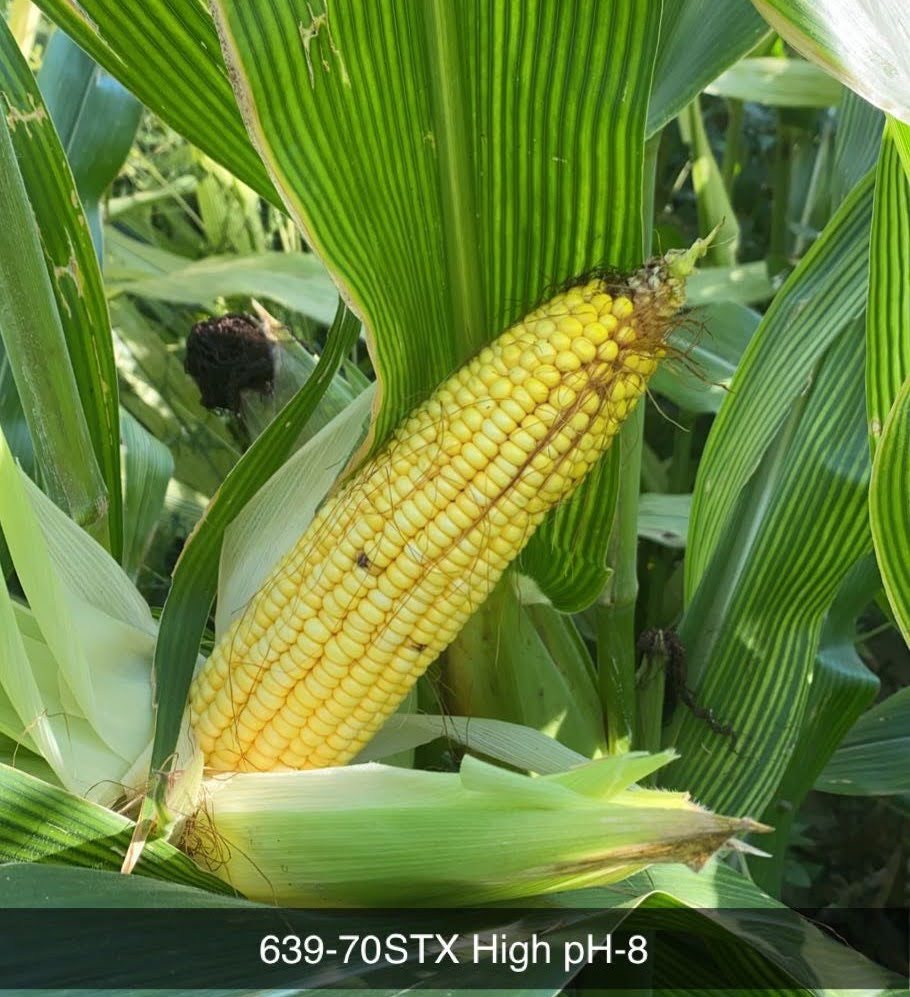HIGH PH RESPONSE TRIALS HELP FARMERS MANAGE HYBRIDS IN TOUGH SOIL CONDITIONS
Farmers in the western U.S. are familiar with the difficulties of cultivating crops in high-pH soils. AgriGold agronomist Sam McCord explains that when soil pH exceeds 7.5, plants may exhibit visual symptoms such as stunted growth and yellowing that can lead to reduced yield potential .
“When the soil pH level rises above 8, it can have severe consequences on the growth of plants, particularly corn. In some situations, the corn plant can turn almost white in color, indicating that the hybrid is not well-suited to high pH soil conditions,” he says.
Key Takeaways:
- AgriGold agronomist Sam McCord conducts trials across the western corn belt to test hybrid response to high pH soils to help recommend proper hybrid selection and placement.
- High pH soils are often caused by elevated calcium, magnesium, and/or sodium levels. High pH can negatively impact yield if not properly managed.
- There are four main strategies to manage for high soil pH: choosing tolerant hybrids, considering elemental sulfur or gypsum applications, adding humic acid to the soil and being mindful of nutrient sources and placement.
Getting To the Root of High Soil pH
McCord says three main elements in the soil can contribute to high pH: calcium, magnesium and sodium.
- Calcium is a naturally occurring element in soils, especially in the western corn belt.
- Magnesium is also a natural soil element and tends to be more problematic in heavy, wet soil types. Very high soil magnesium levels (23%+ base saturation or 350+ parts per million) can increase soil pH about 1.6 times compared to calcium alone.
- Sodium accumulation is problematic in poorly-drained soils, especially where high manure rates are applied. Sodium can increase soil pH by about four times compared to calcium.
McCord says soil tests that measure base saturation can help farmers understand the cation levels in their soil and manage the cause of high soil pH.

Example soil test results for base saturation ratios.
Research That Improves Hybrid Management on High-pH Soils
For several years, McCord has managed hybrid response trials on high-pH soils in Nebraska. He takes visual ratings at early-, mid- and late-season growth stages to gauge how corn hybrids perform throughout the year. The most notable visual symptoms he looks for are yellowing or stunting of the plant, which indicates lower tolerance to high pH soil conditions.
“There are always subtle differences between hybrids and how they respond to high pH soils. Some products may show some yellowing early in the season, but by the final rating, they have overcome some of those early-season challenges and yield well. However, those development challenges persist in some cases, and the plant doesn’t pollinate successfully. It’s helpful to understand which hybrids we can manage for and which are unlikely to be successful on high pH soils,” explains McCord.

High pH response trial showing stunting and discoloration of a non-tolerant hybrid (center).

High pH response trial showing the well-formed ear of a tolerant hybrid.
McCord says in addition to visual ratings, he also examines hybrid root structure.
“I’ve noticed hybrids with a more fibrous root system (more fine root hairs in the top six inches of soil) tend to perform a little better in high pH soils versus hybrids with a deep, coarser root system,” he says.
The diversity of testing environments across Nebraska gives McCord insights across a wide relative maturity product range. He says the information he collects can be extrapolated beyond state borders to other high-pH growing environments.
“Whether it’s north of the Red River Valley in North Dakota or south into Kansas, the data from these high pH response trials is fairly universal in terms of decision-making.”
McCord visits hybrid trials at least three times each season to determine which products in the AgriGold lineup will perform best in high-pH environments.
“I like to focus on new hybrids and compare them against older products with known tolerance to high-pH soils” says McCord. The new hybrids must perform as well as or better than those quality checks to get a high rating. I want to ensure we have the most accurate, useful data for our newest products. It helps with product placement and management and gives farmers confidence in what they can and can’t plant in those challenging pH areas,” says McCord.
Push For More From Tough Soils
For farmers grappling with high-pH soils, McCord offers several management strategies, including hybrid selection.
1. Choose tolerant hybrids.
According to McCord, choosing a tolerant hybrid is one of the most cost-effective ways to improve corn production success in high-pH soils.
2. Consider elemental sulfur or gypsum applications.
Elemental sulfur can help lower soil pH when soil bacteria change the sulfur to sulfuric acid. However, the process happens slowly, and it can take several years to see the full benefit.
“Farmers need to continually apply elemental sulfur to maintain lower soil pH levels. Based on the amount of product required to keep soil pH levels in check, it may not be economical.”
Applying gypsum is another option for well-drained soils if high magnesium is an issue. The sulfate in gypsum reacts with magnesium in the soil, turning it into Epsom salt that is leachable from the soil profile.
3. Add humic acid to the soil.
Humic acid is a natural chelator that helps keep nutrients from getting bound up in the soil, which can be problematic in high-pH environments. McCord says humic acids also offer salt buffering and soil health benefits, which can support crop growth and development in stressful environments.
4. Be mindful of nutrient sources and placement.
Micronutrients are generally less available in high-pH soils. McCord says banding chelated nutrients, such as iron, manganese, and zinc, in the root zone as close to crop uptake as possible helps improve nutrient efficiency and mitigate tie-up in the soil.
For more information on corn hybrid selection and management in high-pH soils, contact your AgriGold representative.



